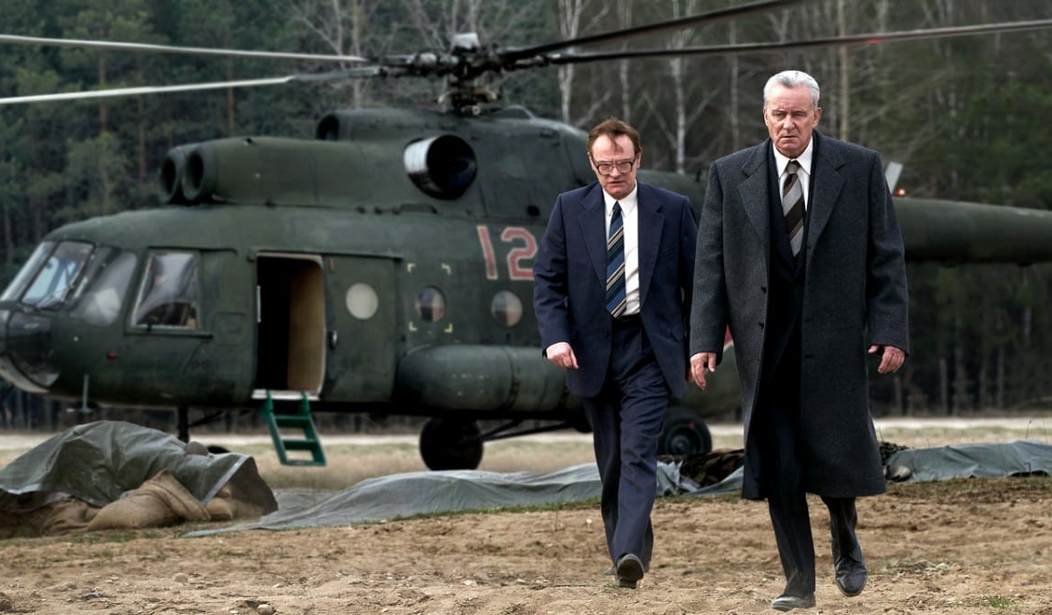The excellent miniseries Chernobyl, which just finished on HBO, is one of the most searing indictments of communism ever put on the small screen, at least since the halcyon days of The Americans.
Systematically and dramatically, Chernobyl exposes the communist disregard for human life and safety, socialism’s ineptness at designing anything that works as it should, and the totalitarian state’s fear that anything that exposes the sham is an existential threat to its existence.
Even more damning, this story takes place during the regime of the Left’s hero, Mikhail Gorbachev, not during the acknowledged bad old days of Stalin.
But you wouldn’t know that from reading the reviews from major critics, who are embarrassingly eager to assure its readers that the show is about almost anything else.
Here are just a few prominent examples. I could go on all day:
The critic at The Atlantic thinks it’s a “fable” about every political issue in the liberal grab bag.
“Whether you apply its message to climate change, the “alternative facts” administration of the current moment, or anti-vaccine screeds on Facebook…”
First of all, somebody needs to look up the words “fable” and “docudrama.” Here, let me help by rewriting your delusional list with things that directly apply and are current: Whether you apply its message to communist totalitarian systems or a socialist command and control economy generally, or to a future takeover of the power supply by fanatics that don’t care about facts as they do ideology…
Likewise, the critic at the New Republic, another formerly honest journal of centrist liberalism that once published interesting pieces, asserts that “nuclear energy itself is perhaps the show’s most developed character,” and says:
“The show’s story, hinging on the conflict between the political impulse toward spin and the scientific imperative to freely share facts—even inconvenient ones—is a chilling one, resonant in an age of climate change. The series doesn’t seem to be making the case that its central problems are uniquely Soviet.”
Really? Let’s take a look at the opening to Episode 4. When a Russian soldier comes to evacuate an old babushka from her farm, she tells the soldier the long history of soldiers coming to her house to tell her what to do, and she describes Stalin’s famine. That sounds pretty “uniquely Soviet” to me—particularly since the scene wasn’t necessary to tell the story of Chernobyl for any other reason than to put it in the context of Soviet Communism.
At the Washington Post, the critic is sure the show is not about communism, it’s about… wait for it… Trump!
“Depressing as it may be, “Chernobyl,” created and written by Craig Mazin and directed by Johan Renck, is a fine study in the uses of sanctioned obfuscation — and how much easier that becomes in a country where media and scientific leadership are tightly restricted. There was a time when that sort of thing might have seemed entirely foreign to an American audience; now, it’s another resonant alarm sounding uncomfortably close.”
Yes, professional grant-writing scientists pushing climate change in contrast to the current administration are being rounded up by the FBI, held in secret torture chambers, and threatened with imminent execution all over America—aren’t they?
The critic at Rolling Stone also ends his review:
“It doesn’t take a nuclear physicist to see why it makes a lot of sense to look back on this moment right now.”
No, but it takes mental gymnastics that put the old Romanian gymnastics team to shame to write a whole review of Chernobyl without mentioning the words “socialism” or “communism” once.
Similarly, the critic at CNN assures us this isn’t about communism at all.
“The Soviets didn’t have a monopoly on stupidity, and the dangers of tampering with such forces are hardly confined by geography or even relegated to the past.”
Yes, CNN proves on a daily basis that the USSR did not have a monopoly on stupidity.
Meanwhile, over at the New York Times, their critic gets that Chernobyl is an expose of communism—and he’s not happy about that.
“… one of the messages of the program is that Soviet approaches don’t work. But there it is: the imposition of a simple narrative on history, the twisting of events to create one-dimensional heroes and villains, the broad-brush symbolism.”
In fact, the New York Times’ review is one of the only negative reviews of the series. The others might pretend it’s not about communism, but they have enough integrity to not discourage readers from checking out this superlative and accomplished piece of television art.
Maybe the mention of the Stalin-directed famine that the New York Times spent the 1930s denying struck a nerve?
(By the way, it was the Forsmark nuclear plant in Sweden that was the first in the West to discover the accident.)
Valery Legasov, the scientist in charge of containing the crisis and preventing a worse one, in testimony before the show trial the Soviet government convened in order to blame the accident solely on the three men in charge of Chernobyl in order to cover up the government’s culpability, sure seemed to think that it was specifically a problem with Soviet communism:
And maybe you should tell me how this chilling threat, which wraps up the series, by the head of the KGB has any relation to anything in American politics:
Anyone who can tell you that Chernobyl is anything other than one of the most powerful indictments of Soviet communism with a straight face is nothing other than a propagandist.
Now try to act surprised that the media is full of them.









Join the conversation as a VIP Member